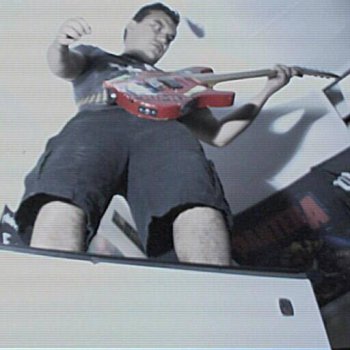The Adventures Of Mikejoffa - Gig Review: The Adventures of Mikejoffa @ Dead Witch, Auckland - 02/06/2023

Tonight’s programme comprised of Rock and Metals acts, of which has some ways of stretching the boundaries of the genre with some interesting influences.
First up was Holy Crime. They played a decent number of covers as well as originals, showcasing a range of genres, starting with of course Rock, incorporating Blues Rock Riffs which let you know you are at Ding Dong. The drummer, Mat Hinton also used a Double Kick, which brings in elements of Heavy Metal. The most surprising was the incorporation of Reggae/Ska, as the guitarists employed the off-beat ‘skank’ in one of their songs. The guitars used by the Benny Richards and Jacob Stutton differed quite a bit from each, as Jacob used the old classic Stratocaster, employing a cleaner, chimy-er tone, whereas the Benny’s guitar was more modern and fuller sounding, so with that, they were able to cover a lot of tonal ground, giving each of the varying genres justice. The rhythm section was solid, with Tom Anderson on bass having quite a groovy feel, which further solidifies their understanding of the different genres. Their cover of Sultans of Swing summarised them quite well, as they started the song by keeping it loyal to the original, with all of Mark Knopfler tasteful guitar licks, and launched into a heavier metal section towards the end.
An annoying thing and a common occurrence I noticed was the difference of volume between the Benny’s clean and overdriven guitar sound. His clean tone was way louder, than overdriven. I felt that it should be the opposite, as typically you would use the overdriven tone for a heavier section of the song and build the dynamic of it, and so having the former problem, achieves the opposite effect for the song.
Another issue was their lack of the cohesion for the song endings. Mat on drums usually finished each song with a typical rock ad-lib style and would get ready for the final hit with the band. Both guitarists locks in to this, but Tom on bass usually checked out earlier, refusing to play the final note with the band; grabbing his beer and looking as though he just wanted the next song to start. Band unity is important, especially when displaying it for the audience. Which was what the next band of the night excelled at...
Monolith, the heaviest and most ‘Metal’ band of the night was up next.
They showed professionalism as they did not muck around and jam on their instruments too much before starting. Once everything was ready to go, they started their backing track, comprising of thunderous sounds and preparing the audience for what was coming. Once it finished, guitarist Glen Dalby took centre stage as he rocked out to the bands opening riff, moving back once the verse begun by Lead Vocalist Daniel Carleton. The band's onstage movement was great, as the band members were able to weave in and out with each to different positions. To date, the only NZ bands I have only seen to do this well is Devilskin and Alien Weaponry. Although the Dead Witch stage is small and it might seem unnecessary, this is something good to practice early on and get used, so once you have access to the bigger stages, you know how to make good use of it. The last point I will make about their onstage presence was with Daniel rocking out and supporting Glen during his guitar solos, which was very nice to see. Sometimes the addition of a guitar can feel like a thing bands allow in order to appease the Lead Guitarist and their ever known ‘ego’, and the band can’t wait for it to be over and continue the song. (Which was an issue I had with the next band, but we’ll get there.) But here the band showed intent with the guitar solos being part of the song.
Musically they delivered all that you come to love about Metal bands, the crunching riffs, aggressive yet tight drumming by Cameron Dennis, and screaming vocals (although Daniel, also utilizes clean vocals just fine). The apply a bit of creativity to the genre with bassist Steve Dalby’s use of effects, he employs some modulation effects in certain parts of the set, and uses ‘volume swells’ in a slower tempo tune.
For all the praise I give them for their onstage presence and energy, there can be drawbacks, and that can impact on your playing negatively, because rocking out and jumping around can cause you to be uncomfortable, especially if you don’t practice playing like that at home. Unfortunately, this caused Steve’s playing to feel somewhat sloppy and loose. As by the musical law I always mention, bass and drums are the foundation of any band. So this caused a bit of shaky ground for Glen and Daniel to stand on, and the band started to lose a bit of groove and power. So I would hope that Steve takes a step back and focus on his playing first and slowly bring in more movement and energy.
And that brings us to the headline of the night The Adventures of Mikejoffa. In a way they are the vice versa of the Monolith, where their playing was super tight but with not as much on-stage presence and movement.
They start off with an energetic Pop-punkish track, followed by a headbanging half-time Metal track, after of which, most of the tracks stays on the same feel. A noticeable problem I had was the unbalanced volume of the guitars; with Doug ten Broeke (lead vocals, guitar) being much louder than the Ezekiel Clark's guitar, so much so that when Ezekiel played his solo you can’t hear anything, but you can see him moving his hands super fast. Although when I did hear his guitar tone, it was quite thin, and it wasn't cutting through the mix. But as the show went there were instances where it was more audible, especially when the two guitarists played joint lead guitar harmonies, a bit of a forgotten art in more recent times.
Saz Scanlan on drums had my attention most of the time. Very tight, and always in the 'pocket’ 95% of the time. Everything she played was with intent, with great precision, dynamic and feel. Whereas in metal, the main focus of drummers is usually on speed and power, here she displayed a lot of tasteful ideas in her beats. She even managed to apply a ‘train’ beat, (usually reserved for Country Music) really well; she applied into a Rock/Metal context seamlessly.
As previously mentioned, I found the amount of guitar solos to be fatiguing. And this is coming from a guitar solo and shredding enthusiast myself, who can enjoy a whole album of Yngwie Malmsteen. I would suggest the guitarists to listen to some of Nuno Bettencourt’s recent interviews on making solos to fit the song, and in doing so, make each solo unique. Because to me it just seems, they were trying to play as fast as they can every solo, with no idea to cling to.
Lead vocalist Doug ten Broeke approached the job of frontman in a more dramatic, narration fashion, which I think worked very well.
The Adventures of Mikejoffa also included some more up-tempo tracks as they approached the end of the set. As well a slower chilled tune, with some interesting, colourful chord ideas.
Overall, this was an enjoyable evening of Rock/Metal music, with each band showing promising aspects to learn from one another.
About The Adventures Of Mikejoffa

Mikejoffa has an eclectic style ranging from various forms of rock music such as grunge, punk, metal and classic rock/psychedelic. The sound reflects mainly upon the themes and tales they tell in their lyrics. They can express soulful ballads or aggressive energy that's hard hitting yet honest.
Mikejoffa has performed over 50 shows across New Zealand. They were placed 3rd in a local Battle of the Bands competition, produced 3 album releases, 2 music videos and featured on Wairarapa TV for their 50th show. Most of their release celebrations have been during NZ Music Month.
Visit the muzic.net.nz Profile for The Adventures Of Mikejoffa
Releases
Other Reviews By Gideon Voon
 Gig Review: Dead Favours @ Galatos, Auckland - 16/06/2023
Gig Review: Dead Favours @ Galatos, Auckland - 16/06/2023
18 Jun 2023 // by Gideon Voon
Tonight's line-up included some of NZ best upcoming rock acts to form in more recent years, so I had great expectations. Animalhead signaled their start by having all members fist-bump at the start.
Read More...
03 Feb 2023 // by Gideon Voon
With the new AUX stage promising better things to come, the Dead Witch Stage reminds of us of the events that were that led us to this point. First up on the Dead Witch Stage, we had Swizl Jager (pictured), if you thought Ding Dong Lounge was exclusively reserved for Rock and Metal, then you will be proven wrong, as Swizl brings the world of Rap and Hip-Hop to us.
Read More...
28 Nov 2022 // by Gideon Voon
Weeks of hard work and preparation culminates in the Grand Final of Auckland's Ding Dong Lounge's Band Competition. As this was a competition, I had a bit of fun trying my best to make a calculated guess as to who would win.
Read More...
16 Oct 2022 // by Gideon Voon
I remember entering this competition for 3 consecutive years (if I remember correctly), during my early days of playing in bands. Each time with a different act, 2 times making the Grand Final.
Read More...
 Gig Review: Banks Arcade @ Tuning Fork, Auckland - 13/08/2022
Gig Review: Banks Arcade @ Tuning Fork, Auckland - 13/08/2022
17 Aug 2022 // by Gideon Voon
In you are a fan of the newer generation of Metal or Heavy Music. You really missed out.
Read More...
 Gig Review: Coridian @ Dead Witch, Auckland - 15/07/2022
Gig Review: Coridian @ Dead Witch, Auckland - 15/07/2022
18 Jul 2022 // by Gideon Voon
Coridian, who I have had the pleasure of sharing the stage with in my band’s most recent NZ gig, have put on a gig titled ‘Power to Rock’. But we do not get the power part straight away, we build up to it.
Read More...
 Gig Review: Midwave Breaks @ Whammy Bar, Auckland - 03/06/2022
Gig Review: Midwave Breaks @ Whammy Bar, Auckland - 03/06/2022
05 Jun 2022 // by Gideon Voon
Tauranga and Hamilton joined forces to send some of their best Alt-Rock acts to show Auckland a thing or two. First up is a 5-piece band from Hamilton, Retro Valley.
Read More...
 Gig Review: Voodoo Bloo w/ Friends @ Ding Dong Lounge, Auckland - 14/05/2022
Gig Review: Voodoo Bloo w/ Friends @ Ding Dong Lounge, Auckland - 14/05/2022
16 May 2022 // by Gideon Voon
It’s mid-2022 and yet another gig is at the mercy of Covid. This time, Melanie was not spared.
Read More...
Most Viewed Artists
Latest Galleries
NZ Top 10 Singles
- APT.
ROSÉ And Bruno Mars - DIE WITH A SMILE
Lady Gaga And Bruno Mars - BIRDS OF A FEATHER
Billie Eilish - TASTE
Sabrina Carpenter - I LOVE YOU, I'M SORRY
Gracie Abrams - ESPRESSO
Sabrina Carpenter - SAILOR SONG
Gigi Perez - LOSE CONTROL
Teddy Swims - A BAR SONG (TIPSY)
Shaboozey - GOOD LUCK, BABE!
Chappell Roan











 Report A Problem
Report A Problem

